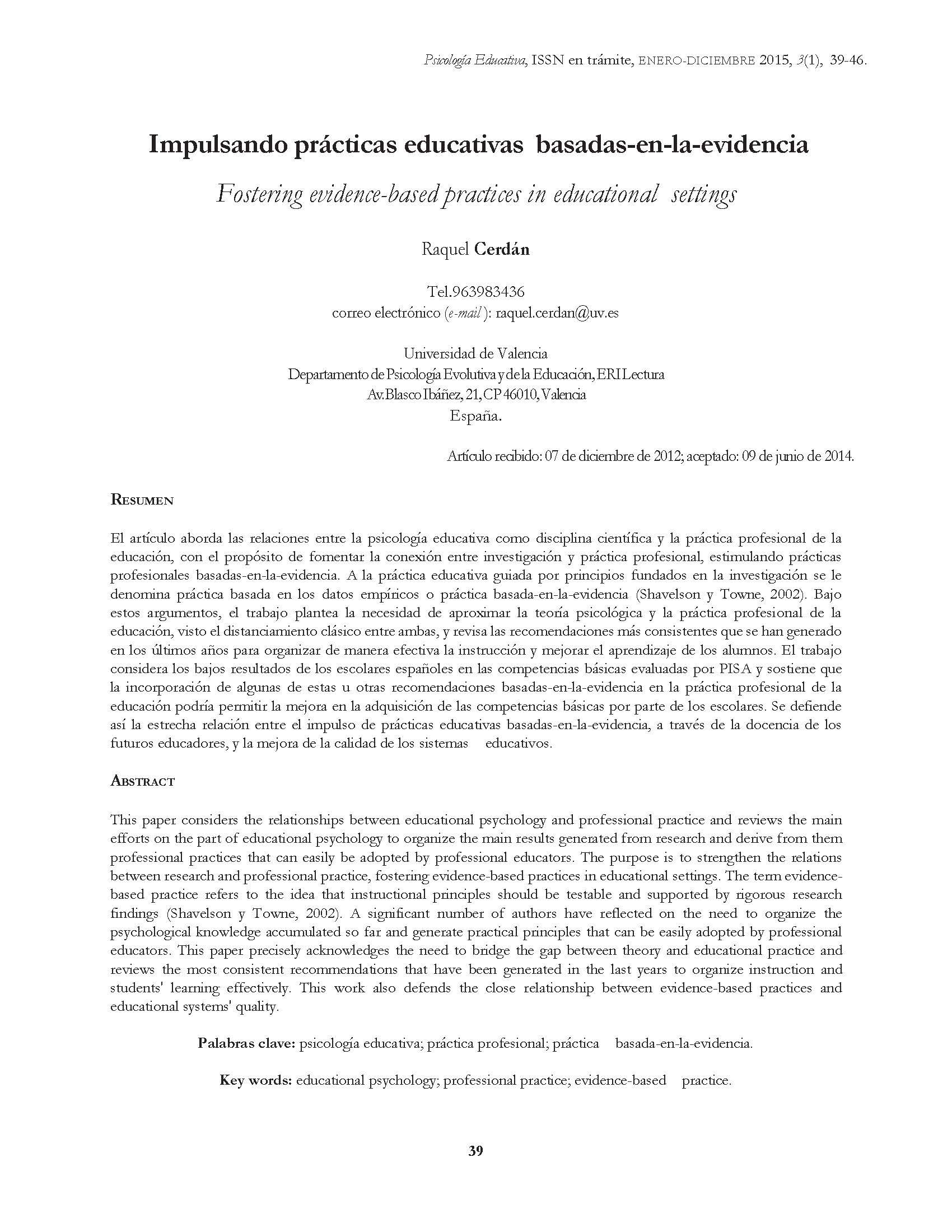Abstract
This paper considers the relationships between educational psychology and professional practice and reviews the main efforts on the part of educational psychology to organize the main results generated from research and derive from them professional practices that can easily be adopted by professional educators. The purpose is to strengthen the relations between research and professional practice, fostering evidence-based practices in educational settings. The term evidence- based practice refers to the idea that instructional principles should be testable and supported by rigorous research findings (Shavelson y Towne, 2002). A significant number of authors have reflected on the need to organize the psychological knowledge accumulated so far and generate practical principles that can be easily adopted by professional educators. This paper precisely acknowledges the need to bridge the gap between theory and educational practice and reviews the most consistent recommendations that have been generated in the last years to organize instruction and students' learning effectively. This work also defends the close relationship between evidence-based practices and educational systems' quality.
References
Berliner (2006). Educational Psychology: searching for essence throughout a century of influence. En Alexander, P.A. y Winne, P. H. (Eds.) Handbook of Educational Psychology (pp.3-28) New York: Routledge. Taylor & Francis.
Calfee, R. (2006). Educational Psychology in the 21st century. En Alexander, P.A. y Winne, P. H. (Eds.) Handbook of Educational Psychology (pp. 29-42) New York: Routledge. Taylor & Francis.
Graesser, A. C., Halpern, D. F., y Hakel, M. (2008). 25 principles oflearning. Washington, DC: Task Force on Lifelong Learning at Workand at Home. http:// www.psyc.memphis.edu/learning/whatweknow/ index.shtml
Grinder, R.E. (1978). What 200 years tell us about professional priorities in educational psychology. Educational Psychologist, 12, 284-289.
Mayer (2010). Introducción al Aprendizaje y a la Instrucción. En Mayer (Ed.) Aprendizaje e Instrucción (pp. 25-68). Madrid: Alianza Editorial.
OCDE (2010). The nature of learning. Using research to inspire practice. Centre for Educational Research and Innovation (CERI). OCDE Publishing.
OCDE (2011). Building a high-quality teaching profession. Lessons from around the world. Background Report for the International Summit on the Teaching Profession. OCDE Publishing.
Pashler, H., Bain, P., Bottge, B., Graesser, A., Koedinger, K., McDaniel, M., y Metcalfe, J. (2007) Organizing Instruction and Study to Improve Student Learning (NCER 2007-2004). Washington, DC: National Center for Education Research, Institute of Education Sciences, U.S. Department of Education.
PISA (2009). PISA 2009. Programa para la evaluación internacional de los alumnos. Informe Español. Ministerio de Educación: Instituto de Evaluación. Rychen, D. S. y Salganik, L. H. (Eds.) (2003). Key competencies for a successful life and a well-functioning
society. Ashland, OH, US: Hogrefe & Huber Publishers.
Shavelson, R. J., y Towne, L. (Eds.) (2002). Scientific research in education. Washington DC: National Academy Press.

This work is licensed under a Creative Commons Attribution-NonCommercial-NoDerivatives 4.0 International License.
Copyright (c) 2024 Universidad Nacional Autónoma de México


